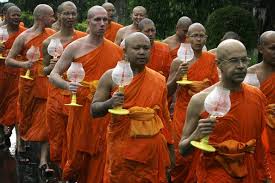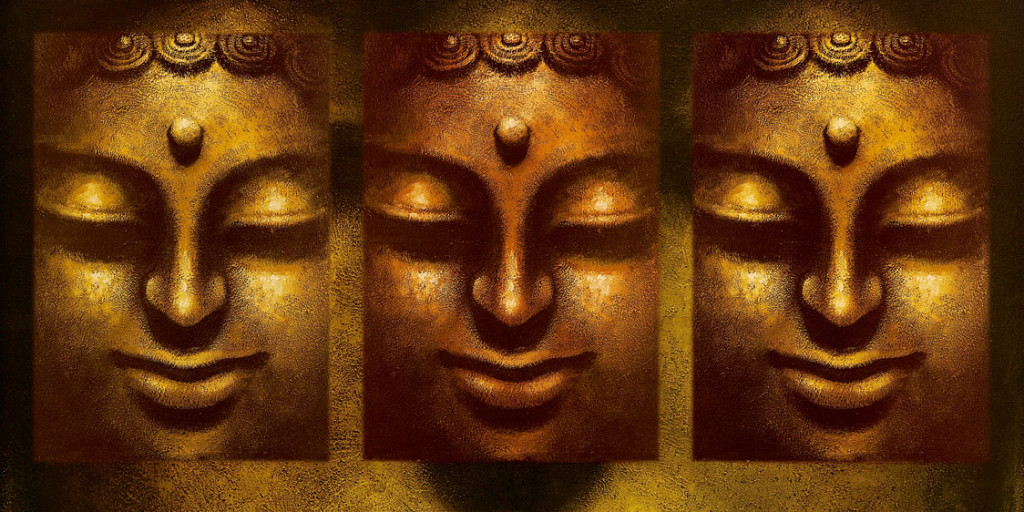 The Mahayana distinguishes itself from the Buddhism of Pali Canon by terming the latter the little (hina) Vehicle (yana) of liberation and itself the great (maha) Vehicle – great because it comprises such a wealth of upaya, or methods for the realization of nirvana. A preliminary study of the Pali Canon will certainly give the impression that nirvana is to be realized only through rigorous effort and self-control, and that the aspirant should lay aside all other concerns for the pursuing of this ideal. Mahayanists may be perfectly correct in assuming that the Buddha intended this emphasis as an upaya,a skillful means of enabling one to realize, correctly and vividly, the absurd vicious circle of desiring not to desire, or of trying to get rid of selfishness by oneself. For this is certainly the conclusion to which the practice of the Buddha’s doctrine led. It may be attributed to laziness and loss of nerve, but it seems more plausible to suggest that those who remained in the path of self-deliverance were merely unconscious of paradox involved. For wherever the Mahayana continues to teach the way of liberation by one’s own effort, it does so as an expedient for bringing the individual to a vivid awareness of his own futility.
The Mahayana distinguishes itself from the Buddhism of Pali Canon by terming the latter the little (hina) Vehicle (yana) of liberation and itself the great (maha) Vehicle – great because it comprises such a wealth of upaya, or methods for the realization of nirvana. A preliminary study of the Pali Canon will certainly give the impression that nirvana is to be realized only through rigorous effort and self-control, and that the aspirant should lay aside all other concerns for the pursuing of this ideal. Mahayanists may be perfectly correct in assuming that the Buddha intended this emphasis as an upaya,a skillful means of enabling one to realize, correctly and vividly, the absurd vicious circle of desiring not to desire, or of trying to get rid of selfishness by oneself. For this is certainly the conclusion to which the practice of the Buddha’s doctrine led. It may be attributed to laziness and loss of nerve, but it seems more plausible to suggest that those who remained in the path of self-deliverance were merely unconscious of paradox involved. For wherever the Mahayana continues to teach the way of liberation by one’s own effort, it does so as an expedient for bringing the individual to a vivid awareness of his own futility.
 Various indications suggest that one of the earliest notions of the Mahayana was the conception of the Bodhisattva, not simply as a potential Buddha, but as one who by renouncing nirvana was at a higher spiritual level than one who attained it and so withdrew from the world of birth and death. In the Pali Canon the disciples of Buddha who attain nirvana are termed Arhans or “worthy ones,” but in the Mahayana texts the ideal of the Arhan is accounted almost selfish. The Bodhisattva, however, is one who realizes that there is a profound contradiction in a nirvana attained by himself and for himself. From the popular standpoint the Bodhisattva became a focus of devotion (bhakti), a savior of the world who had vowed not to enter the final nirvana until all other sentient beings had likewise attained it. For their sakes he consented to be born again and again into the Round of samsara, until, in the course of innumerable ages, even the grass and dust had attained Buddhahood.
Various indications suggest that one of the earliest notions of the Mahayana was the conception of the Bodhisattva, not simply as a potential Buddha, but as one who by renouncing nirvana was at a higher spiritual level than one who attained it and so withdrew from the world of birth and death. In the Pali Canon the disciples of Buddha who attain nirvana are termed Arhans or “worthy ones,” but in the Mahayana texts the ideal of the Arhan is accounted almost selfish. The Bodhisattva, however, is one who realizes that there is a profound contradiction in a nirvana attained by himself and for himself. From the popular standpoint the Bodhisattva became a focus of devotion (bhakti), a savior of the world who had vowed not to enter the final nirvana until all other sentient beings had likewise attained it. For their sakes he consented to be born again and again into the Round of samsara, until, in the course of innumerable ages, even the grass and dust had attained Buddhahood.
Source: The way of Zen, by: Alan W. Watts